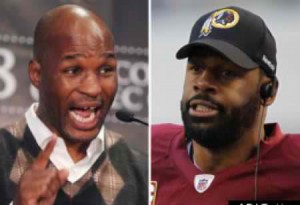(ThyBlackMan.com) A couple days ago, I was reading an article on ESPN talking about Donovan McNabb. For those of you who don’t know, he’s the ex QB of the Philadelphia Eagles and, as it appears, also the ex-QB for the Washington Redskins after being traded there last year.
The article targeted Bernard Hopkins’ assertion that McNabb wasn’t black enough because he grew up in the suburbs of Chicago.
I’ll refrain from addressing Hopkins’ comment, mostly because I think it’s stupid, and partially because this blog isn’t about that.
McNabb has taken much criticism in his career. From everybody. Everywhere.
Detractors ranged from The NAACP, the 3rd string QB, the coaches, former teammates, and even Rush Limbaugh. In the 10 or so years he’s QB’d in the  league, he’s never uttered a word against these people. At the most, his agent will release a statement on behalf of McNabb and McNabb will find some way to maneuver around the subject when asked. You know, to be the bigger person…
league, he’s never uttered a word against these people. At the most, his agent will release a statement on behalf of McNabb and McNabb will find some way to maneuver around the subject when asked. You know, to be the bigger person…
And I can respect that.
Even if I don’t agree with it.
You see, certain situations in life, there are usually two roads you can take.
The high one or the low one.
As I’ve grown older, I’ve found that the line between the high road and the low road more so lies in the language used as opposed to the reaction.
For example, someone publicly calls me out in the media. I now have two choices. I can address them, or I can let it go.
Depending on the comment, addressing them could be seen as taking the “low” road. After all, people will talk about you until the day you die, and you can’t fight every battle right?
Not quite.
If I address the person who’s attempting to slander me, depending on HOW I address that person will have an impact on the perception. If I say “aye, fuck that nigga and tell him can eat a dick and if he don’t like it he can see me in public and we can get into some old gangsta shit.”
Or I could say something like “the comment is childish and it’d probably be best served if he decided to be less worried about me and more worried about his personal affairs.”
When I was younger, I felt I was “too old” to be getting into a war of the words with people. Wasting extraneous energies on trivial matters is tedious and petty, so why bother to engage in the behavior?
The older I get, however, the more I realize you can’t let people say whatever they want without consequences and repercussions. No, you can’t address everything, but the things you can address, you probably should.
Refusing to address blatant and outright disrespect will allow people to believe: 1) you are guilty of said slanderous comment or 2) its ok for them to say what they want about you because nothing will happen to them.
A side effect of #2, is instead of people looking at you with an air of respect for thinking you’re above addressing people, they look at you as weak and will not hesitate to attack you. After all, they have nothing to be afraid of, because they know you will say nothing.
This is the problem McNabb has.
People have taken shots at him for so long, and he’s remained quiet for so long, it’s essentially “open season” so to speak.
I know MLK told people to turn the other cheek, but when you get slapped on both sides there’s a decision you have to make.
With this knowledge in mind, I’ve changed the definition of being the “bigger” person. I now believe to be the bigger person means to know which battles are worth fighting and which ones are worth letting slide.
The perception of other people has a bit to do with it, but it’s more so about protecting oneself from random public attacks and I find that it actually works the same way in all facets of life.
When you’re a kid, and you’re bullied, if you don’t fight back, you’ll never stop getting picked on. People will feel sorry for you, but nobody will come to your aid because they see you won’t even come to your own aid. And next thing you know, you’ll have MORE kids picking on you.
When you’re an adult in the workplace setting, an insult from a co-worker or boss that goes unchecked can lead to widespread feelings/actions of disrespect from your colleagues. You can’t expect for people to respect you as a leader, when you give people a straight path with no resistance to come at your neck.
And therein lies McNabb’s (and for that matter, plenty of other people’s) problem. You think by ignoring the attack on your character you’re being a bigger person when all you’re really doing, is making yourself a bigger target.
At least, that’s my opinion. Feel free to agree or disagree with me in the comment section. Am I right? How do you tend to handle similar situations? What does it mean to you to be the “bigger person” about a situation?
Staff Writer; Garfield Hylton
To find more articles from this talented writer visit; Keeping It Real.
Also connect through twitter; RealGoesRight.

















The question of disrespect as opposed to letting comments dangle and finally disentigrating into nothing is a thorny issue in the Black community. It has lead to multiple incarcerations and skyrocketing health costs in our communities.One must evaluate each incident on an individual basis and respond accordingly. Applying a hardline approach to conditions which don’t require such an intensive action could lead to violence and certain death.